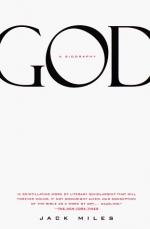
|
| Name: _________________________ | Period: ___________________ |
This test consists of 15 multiple choice questions and 5 short answer questions.
Multiple Choice Questions
1. What do these references do?
(a) They make the book more confusing for those who do not know the sources.
(b) They enrich the experience for those who grasp comparison, but do not demand look-up for those who do not.
(c) They do not add to the biography of God.
(d) They encourage readers to learn more about what is referenced.
2. On what promise does God make good?
(a) To use foreign nations as instruments to punish his erstwhile convenant partner.
(b) To destroy Israel a second time.
(c) To protect his people.
(d) To love his followers.
3. What does God become when Pharaoh legislates that all Israelite boys be killed at birth?
(a) For the second time he becomes a warrior.
(b) For the second time he becomes a father.
(c) For the first time he becomes a warrior.
(d) For the first time he becomes a father.
4. How is the Hebrew God different from those of Greek mythology?
(a) He creates a human that is also part god.
(b) He is peaceful at all times.
(c) He takes no action without thinking of man, has no "adventures," and has no divine companions.
(d) He has a wife.
5. In the books of Kings what traits come to the fore?
(a) El's traits.
(b) Baal's traits.
(c) Yah's traits.
(d) Sab's traits.
6. What is the name of the Hebrew Bible?
(a) The Taliya.
(b) The Torrey.
(c) The Toutenkamun.
(d) The Tanakh.
7. What is the purpose of the second interlude, "Does God Fail?"
(a) It interviews various religious authorities on their opinions on whether God has failed them.
(b) It criticises God for all his failures.
(c) It performs a status check on how god has been characterized in the first eleven primarily historical books of the Tanakh, before turning to the prophets and other literary forms.
(d) It gives proof of God's successes.
8. Why do the Jew leave the text where it is?
(a) For dramatic effect.
(b) They adopt the codex as a way of preserving the contents of their ancient scrolls.
(c) It is the true order and should not be changed.
(d) God asks to have the order kept in its original form.
9. What do both Jews and Christians concede without blasphemy?
(a) All religions are equal and true.
(b) Both Judaism and Christianity are the true religions.
(c) The Bible is full of fictional tales.
(d) The Bible may be appreciated as literature.
10. What do the Biblical writers do?
(a) They criticize God.
(b) They ramble on about stories from the past.
(c) They criticize the Israelites.
(d) They testify about God.
11. How does God come to understand that he wants to limit and channel the gift of procreation?
(a) Through man.
(b) Through his thoughts.
(c) After creating the earth.
(d) After Adam takes a bite from the apple.
12. What has the Tanakh always been?
(a) A guide to the godly life.
(b) The change of God from monotheism to polytheism.
(c) The story of God's struggle to be polytheistic.
(d) The story of God's inner conflict being resolved into monotheism.
13. Believers adore God as the origin of what?
(a) The human species.
(b) All virtue.
(c) All animals.
(d) The cosmos.
14. How is David indicted under Deuteronomic Law?
(a) He kills Goliath and gloats about his win.
(b) His behavior towards Bathseba, whom he seduces and her murdered husband, whom he arranged to have killed.
(c) He defies God's law.
(d) He tricks Bathseba into marrying her husband.
15. To what literary character does the author compare God?
(a) Jo March.
(b) Caesar.
(c) Juliette.
(d) Don Quixote.
Short Answer Questions
1. Why did the horrible destruction threatened in Deuteronomy 28 have to take place?
2. For what acronym is "Tanakh?"
3. What element remains dominant in God through the end of 2 Samuel?
4. Who is the protagonist in the Tanakh?
5. How does a fully-integrated Yahweh/Elohim God appear to Moses?
|
This section contains 685 words (approx. 3 pages at 300 words per page) |

|




